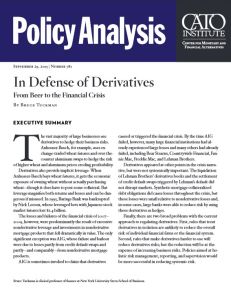Join getAbstract to access the summary!

Join getAbstract to access the summary!
Bruce Tuckman
In Defense of Derivatives
From Beer to the Financial Crisis
Cato Institute, 2015
What's inside?
In the long run, rules constraining the use of derivatives are likely to do more harm than good.
Recommendation
Derivatives have borne the brunt of blame for the 2008 financial crisis. However, painting derivatives with one broad brush is highly misleading and patently incorrect, according to finance professor Bruce Tuckman. He posits that government-devised rules to avoid another crisis fail to address the true causes of the collapse and may discourage the use of all derivatives, which help businesses manage risk. getAbstract recommends this comprehensive overview of derivatives to regulators, executives, investors and others with an interest in minimizing risks to the financial system.
Summary
About the Author
Bruce Tuckman is a finance professor at New York University Stern School of Business.

















Comment on this summary